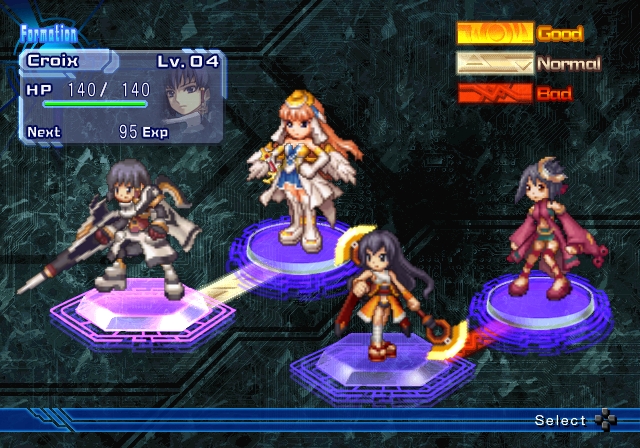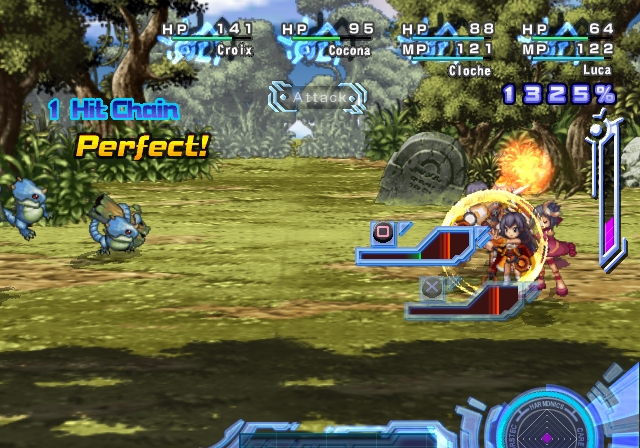|
|

|
PLATFORM
|
PS2
|
BATTLE SYSTEM
|

|
INTERACTION
|

|
ORIGINALITY
|

|
STORY
|

|
MUSIC & SOUND
|

|
VISUALS
|

|
CHALLENGE
|
Very Easy
|
COMPLETION TIME
|
20-40 Hours
|
|
OVERALL

|
+ Unique battle system
+ Typically fun, breezy Gust soundtrack
- Omnipresent slow down.
- Poor translation
- A few crash bugs.
|
Click here for scoring definitions
|
|
|
If you're reading this page then by now, you probably already know whether Gust developed games are up your alley or not. If you don't know, let me break it down for you in the fastest possible way. If you need top tier graphics, item creation bores you, but grinding excites you, you're not going to find anything here to love. Do you like item creation, sprite style graphics, really interesting battle systems, and you're looking for something easy between Megaten games? Then Gust is there for you, my friend. Here's the catch, if you're new to the Gust fold, Ar Tornelico II is not the place to start.
From the very beginning the game is a bit schizophrenic. It opens with a touching scene of a family being violently ripped apart, throwing up big red spoiler flags about things that would happen later in the game. After that, we move on to the hero of the tale, Croix, an up and coming super star in the ranks of the Grand Bell Knights. As a member of that organization his greatest duty is hunting and containing I.P.D infected Reyvateils. As in the previous game, Reyvateils, a female only species hold a strange place in society. Their powerful song magic is a useful tool, but also makes them somewhat feared, particularly when I.P.D. infected. I.P.Ds are cursed by the tower administrator (goddess) who controls the land due to a struggle which took place sometime in the history of Metafalss, the "world" on which the game takes place, when the people tried to create a legendary land called Metafalica for themselves. The curse on them causes Reyvateils to have a sort of berserker mode, and while they are in it, they become extraordinarily powerful, but are out of control.
While I was looking for deep connections and echoes between the opening scene, the game instead has Croix, the near-sighted, spineless, knight takes his eleven year old live in "little sister"/girlfriend/military partner Cocona on a mission to rescue the Holy Maiden Cloche, symbolic leader of the Grand Bell Knights from a mysterious army. Croix, despite his complete social ineptitude is forced repeatedly to be the voice of reason during this mission, as he is throughout the game. As we all know, being reasonable is offensive, and it doesn't take him long to develop a love/hate relationship with Cloche. From there, the game whizzes in every direction imaginable. Characters come and go so frequently during the first twenty hours of the game it becomes hard to follow, and the plot shifts gears too often and too quickly for the material to sink in. When mystery builds to war, forcing Croix to choose between his best friends from childhood or his Commanding Officer and the woman he's sworn to protect, you'd expect some lengthy epic about how the choice is made and how he comes to terms with it. But regardless of what side the player chooses to push Croix towards, the war ends in less time than it takes to read. The game proceeds to blindside you with plot points cropping up and falling away in rapid succession, leaving you little time to digest what you've already seen. I wish I could say that the twists in the plot were surprising and fun, but it would be a lie. The game gets your hopes up that it will deeply explore morally ambiguous issues, but ultimately it comes down to the same standard JRPG fare with the ones who are right and the ones who are wrong, with clichéd turning points and shifting alliances.
 The relationship between a Reyvateil and her guardian effects her ability to sing song magic.
The relationship between a Reyvateil and her guardian effects her ability to sing song magic.
|
|
Gust games often feature lively, bizarre casts that are actually more fun than the main story, which is part of why the lengthy dating sim-esque cosmospheres in both Ar Tornelico games are so interesting. Unfortunately, Croix has got to be the single most boring human being in all of Metafalss. Conversations with the Reyvateils quickly become redundant as similar topics come up repeatedly. It doesn't help that they tread old ground with none of the girls being competent cooks and constantly referencing their clumsiness. Half the player characters are almost completely ignored and the villains' motivations seem underdeveloped. It's clear that the developers put a lot of thought into creating a fascinating world, as they had in the previous game, but unlike said predecessor, they flubbed the presentation. Top it off with a sub-par translation and it reminds me of nothing so much as reading the Lord of the Rings trilogy in Elvish. They make a chore out of something that could have, no, should have been great. If I were to list the number of typos, inconsistencies, unusual grammar, and even a few instances where character portraits changed clothing for no discernible reason in the middle of a conversation, you, my gentle readers, could be here all day.
Of course, there's more to RPGs than the story. Ar Tornelico II sports a semi real time system which involves having your front row fighters strategically use three different kinds of attacks and a support option mapped to the four directional buttons. For example, one style of attacks allows your front line fighters to use higher level attacks, one increases the speed with which song magic becomes stronger. It's actually a very fun system, since if you play it right, you'll buy yourself extra time to throw in more attacks, set front line up to use powerful special moves and cause your songs to morph into other, better versions of themselves. While in the first game, you had three fighters and one Reyvateil in use at any one time, in Ar Tornelico 2, you actually have two of each, with one front line fighter assigned to guard each Reyvateil, and the possibility of combination magic. The biggest problem with the battle system is that the game is so easy you'll rarely be able to take advantage of the system. Most enemies die before your front row can whip out its impressively powerful, seizure inducing super moves, and I played the entire game without once using combo magic. The timed button presses for the defense phase are a lot of fun too, but they've got a few issues which, depending on your disposition, either breaks the system or makes it more challenging and entertaining. The first is that the game often can't keep up with itself and throws the indicator timing off due to slowdown on the flashier multi-hit moves. The other is that having a certain passive skill makes it so easy to get perfect defenses that you're never in any danger.
 Timed button presses when defending were a nice touch.
Timed button presses when defending were a nice touch.
|
|
Outside of battle, Ar Tornelico 2's system closely mirrors that of its predecessor. The graphics are standard Gust fare, cleanly animated 2D sprites, with varying levels of 2D images in the foreground and background creating a 3D feel. The music is the same sort of catchy, SFX laden affair one would expect from its developer, and the encounter gauge, which limits the number of random battles that can occur in one area and warns you when one is coming is more or less identical to that of the original Ar Tornelico. Perhaps the most interesting part of a Gust system would be the item creation, however, and on this, I think the Ar Tornelico 2 comes up short. First, the items produced are generally almost worthless. You can often find better equipment than you can make, and there's rarely if ever a need to use items in battle. Which means the best reason to create them is because bath toys and powders make good conversation pieces between Reyvateils. Conversations between them boost their sync levels and make it easier to sing combo magic, which you won't use so it doesn't matter. The fact that the shopkeepers are drastically more interesting and complex than most of the PCs is a bit disheartening, but it's good to see someone in the game has a personality. The best part of item creation- experimenting to make new recipes or getting better effects from older ones is gone. The recipes are provided by the shops, and there is no item substitution. Different Reyvateils will create different items out of the same recipe, but that's all. On a related note, the intense customization through combinations of grathnode crystals in the previous game is gone and replaced with a much more static system. The combination of those two things makes Ar Tornelico II's system feel watered down to a series veteran, but it may come as good news to those who avoided Gust games before.
With all that said, the game was still a lot of fun. I enjoyed it as much as I thought I would. If you liked other Gust games, Ar Tornelico II is a fine addition to your collection. It is not, however, a master piece by any standards. Replaying the game to see the alternate path and endings feels more like work than play. So casual Gust fans can give this game a miss and wait for the next one. Or they could hunt down a copy the original Ar Tornelico if they missed it. Newcomers would be well advised to start elsewhere unless an aversion to heavy item creation is their sole reason for not playing Gust games. In which case, I repeat: better to start with the original Ar Tornelico.
Review Archives
|









